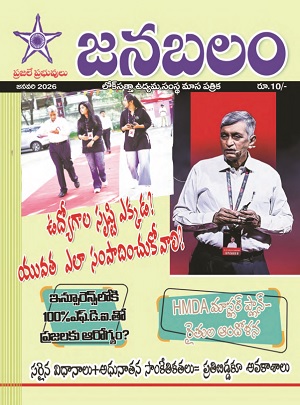Andhra Pradesh and Telangana are interdependent and complementary to each other. Drawing a line on a map does not have to lead to a disruption of the economy
- Dr. Jayaprakash Narayan
One year after the partition of Andhra Pradesh (AP) and the creation of Telangana state, the visceral passions and parochial polarization have subsided to some extent. Several states have been created after Independence; but the partition of Andhra Pradesh aroused the strongest passions on both sides, creating a surcharged atmosphere in all three regions of the state—Telangana, coastal Andhra and Rayalaseema. The first-ever division of a large non-Hindi linguistic state, and Telangana, containing the vibrant, large Hyderabad city being separated, have led to profound political, economic and psychological consequences. Hyderabad had a government surplus of Rs.13,000 crore per year, and residual AP feels obviously impoverished with the loss of the city.
But the greater issue of national importance is the manner of division. Until 2014, every state formation was by consensus—either by a universally acclaimed commission’s report (eg. States Reorganisation Commission), or a consensus in the state and a resolution in the state legislature seeking a partition of the state.
Political scientists regard non-extinguishability of a state as the key principle of federalism. If the boundaries of a state could be redrawn at will by the federal government without the state’s express consent, then the polity becomes a de-facto unitary one. The Andhra Pradesh legislative assembly adopted a resolution opposing the Andhra Pradesh Reorganisation Bill, 2013, reflecting the serious misgivings of the majority of the people of the state. Nevertheless, both the then ruling Congress and opposition BJP joined hands in Parliament to enact the law dividing the state.
Over the past 25 years, our federalism has matured significantly. A quasi-unitary nation evolved into a truly federal nation.
The partition of Andhra Pradesh without the state’s consent had the potential to undermine the very existence of states and destroy federalism as we knew it. Happily, the 2014 verdict in both AP and Telangana safeguards our federal polity. The decimation of the Congress in AP, and the rejection of both the Congress and the BJP in Telangana despite their claims of being instrumental in the formation of the new state ensured that no major party will indulge in reckless adventurism for short-term political gains in dealing with the complex and sensitive issue of formation of new states.
It is now almost certain that the earlier position of building a consensus in the state and obtaining its consent before redrawing its boundaries has been restored. But the creation of the new states was also an opportunity to rethink governance, correct past mistakes and chart out a new course. Here, the record in both states is mixed, thanks to the high propensity for centralization and arbitrariness displayed by the two chief ministers—K. Chandrasekhara Rao and N. Chandrababu Naidu.
In both states, governments deliberately indulged in partisan rhetoric calculated to rouse regional sentiments and score cheap political points. The Union government’s ineptness and passivity added to the woes of the people of both states.
The allotment of officers and staff has been acrimonious and prolonged, and is still not completed. On the management of irrigation projects—notably Srisailam and Nagarjunasagar on the Krishna river—there is heightened tension and rhetoric. In fact, the police of the two states fought a pitched battle in Nagarjunasagar, an unprecedented event in modern India. Even officials of all-India services have failed to exercise restraint and balance—cases are registered against each other, and officials often talked out of turn in public to play to the gallery or please their political masters.
What is more, both chief ministers have been in a reckless race for competitive populism, potentially undermining the future of their states. Free power, free rice, loan waivers, the highest ever rise in wages of government employees (45%), and a plethora of ‘gifts’ to people on every occasion at great cost to the exchequer and with no lasting wealth-creation have become endemic in both states.
Andhra Pradesh has special problems because of the loss of revenue as well as job opportunities on account of losing Hyderabad. The Union government gave a commitment to make special grants to help meet revenue deficits, and the 14th Finance Commission made a provision. But the Union government can only give grants to fill the gap arising out of a state’s partition, not to compensate for fiscal profligacy after the partition. Unless the state learns to exercise fiscal prudence, the resource crunch will worsen with time, and will retard the growth of a region with immense potential. Despite the loss of Hyderabad, AP has great advantages—a hunger for education, high-quality human resources, low birth rates, water and mineral resources, agricultural surplus, a culture of entrepreneurship and risk taking, and a long coastline.
However, the AP government is excessively focused on building the new capital Amaravathi as a mega city on par with Hyderabad. The needs of other regions are neglected. Administration is highly centralized with little devolution to local governments or various ministries.
Election expenditure in AP and Telangana are among the highest in India—Rs.5-10 crore per candidate for assembly and Rs.25-50 crore for Lok Sabha elections is common. As a result, massive retail corruption in transfers and postings, contracts and tenders, and land, sand and mining has become endemic. Caste polarization is deepening as parties, particularly in AP, shamelessly use politics as a means of caste domination, or mobilizing vote banks on caste lines. Both states are now witnessing dynastic politics and the rise of political fiefdoms.
However, all is not lost. Both states can compete in a healthy manner. Particularly, improving power distribution and management and infrastructure will help the whole region. In a region with tremendous demand for quality education and healthcare, a focus on quality outcomes in both sectors will unleash great energy and pave the way to prosperity.
Power and resources need to be devolved to local governments with adequate safeguards to enforce accountability. And at least a few steps to reduce the burden of corruption—a service guarantee law, citizens’ charters with penalties, strong, empowered Lokayukta and local ombudsmen—should be taken immediately.
AP and Telangana are interdependent and complementary to each other. Drawing a line on the political map does not have to lead to a disruption of the economy. Nor does a state border affect the liberties of all Indians. AP and Telangana have immense potential for growth, but parochial and power-centred politics must first give way to enlightened leadership.
Courtesy: Live Mint
Tuesday, June 2, 2015
Subscribe to:
Post Comments (Atom)





Same old venom being spewed on Telangana by the same old inane "joksatta cheap" LOL
ReplyDelete